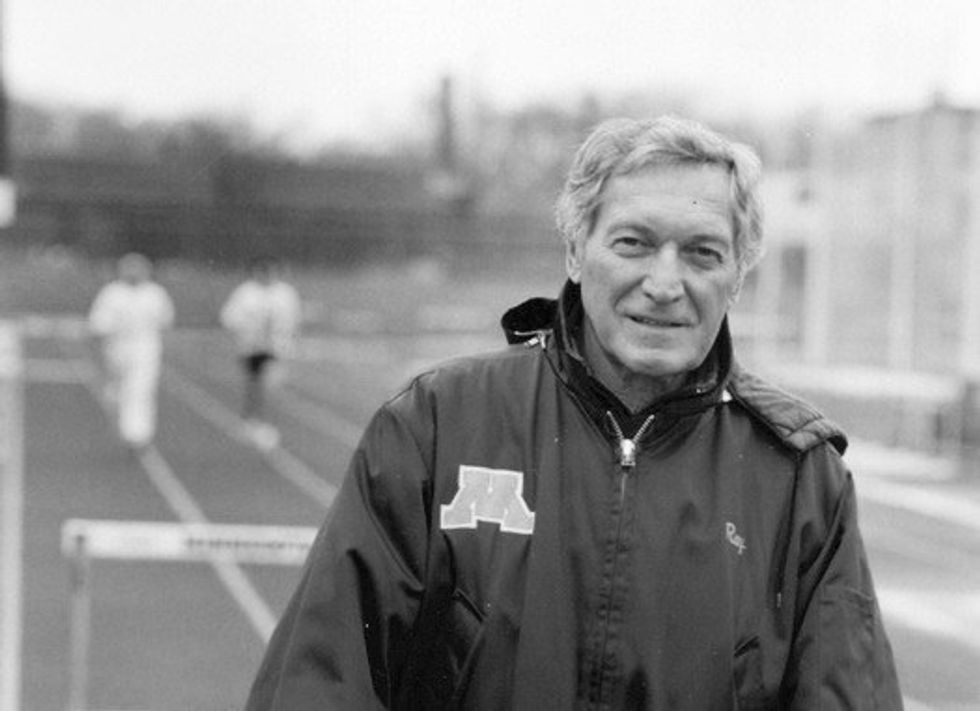On a typical morning, you can find Bob Wagner running fifteen miles through the steep hills, tall pine trees, and curvy dirt trails of Bemidji, nestled in northern Minnesota. Most seventy-year-olds consider going for a brisk walk to be their daily exercise. But for Wagner, that's not enough. On a bad day, eight miles is put in, but you'll still hear him saying "I didn't do much today." Other than working out, you can find Wagner doing random jobs around his house, which he shares with his wife, Linda. His home, which looks more like a cabin inside and out, is located close to trails that circle lake Bemidji. Tucked away on a hill, his house embodies the life of peace and retirement. Since then, well let's look back.
Wagner, or as others called him "Wags", grew up in St. Louis Park, near Minneapolis. His fuel for running started at a young age. He recalls, "My father and I didn't have a very good relationship, and he was always fighting with my mom." Being brought up in a broken family made him seek a release. Running was his outlet, his escape, and where he felt unstoppable. "I never got a day off. On 'easy' days, I still put in miles upon miles. I'd run twice a day, every day." That's what stood Wagner apart from other young athletes; he was working harder than others were willing to give. He broke a twenty-one year old State Track record in the 800-meters (1:55) at just fifteen-years-old. Everything became surreal. He completed his high school career as a six-time state champion.
He was so fast, so young, that everyone knew who he was. He received mail everyday. Numerous colleges sought him out, but he ultimately gave a letter of intent to the University of New Mexico, knowing they had a good name for their program.
The legendary Roy Griak, who most identify as the University of Minnesota's track coach from 1963 to 1996, coincidentally happened to be Wagner's high school coach at St. Louis Park before he worked for the U of M. Griak was more than a coach, though, "He was like my second dad. I would babysit his kids on the weekends." Wagner laughs, "And when he found out I signed with New Mexico, he called me up and said 'Oh no, you're not.'" Griak wanted to continue his journey with Wagner, so he persuaded him to run for the U of M. It wasn't hard to reject the proposition, considering a full ride scholarship was in the air.
Wagner was on top of the world. At first glance, he fit the stereotypical look of a long distance runner, lanky and bony. Looks can be deceptive, however. For as slight his body frame was, he placed top three in the Big Ten Conference Championships throughout college. After graduating with a bachelors in physical education and health, Wagner's speed never slipped away. And boy, could he still fly.
It was a whirlwind, living his dreams, Wagner qualified for the Olympic Marathon Trials in Oregon when he was twenty-six. But he saw his dreams drifting further away during the race when he had to unexpectedly change shoes. Disappointed, he said, "You can't have regrets or change the past. But, I know if I wouldn't have had to change my shoes, I would've made it." Just the thought of being so close to the Olympics (2:16), I could feel my heart breaking for him. He then enlisted in the military, trained in Berlin, and ran the 5k and 10k internationally through his late twenties. "I would hop the fence just to get into the Berlin stadium to train. Security would come up and talk to me but I couldn't speak their language so they let me get away with it. And the kind of people I met..." his eyes widen, "I mean, I trained with Olympic Champions."
Fast forward forty-five years. It's 2016 now. Many things have changed but Wagner's devotion hasn't. Walk into the Bemidji State University's Recreational Center and you can't miss him. He'll be dressed in a sweat suit, ball cap on, a timer around his neck, and sporting sneakers he spray painted gold because he thought they looked "hip."
He currently remains deeply involved in the BSU's track community and doesn't plan on quitting anytime soon. Other student-athletes consider Wagner as a coach, and treat him like one. For how engaged he is, little would strangers know that he volunteers, freely. He accompanies most meets (even if they are hours away), comes to every practice, supervises weight sessions, and has been involved for seven years and counting.
Wagner may not be receiving a financial gain from the time put in, but that doesn't take away from the appreciation of having him around. Whether it's a smile, a joke, or yelling out motivational phrases during athletes excruciating workouts, every effort is counted for. Practices can get repetitive and long, so it's refreshing to have a bright personality around to keep things light. Wagner is always wondering how athletes races went, and beyond. He genuinely connects with people, which is what makes Wagner so likable, his ability to be present and personable.
In order for him to tell you about his accomplishments, you have to meddle. Being a senior on the BSU track team, I have known Wagner for four years now, and it wasn't until my junior year that I found out how fast Wagner really was. Astonished, I was in disbelief of how much time it took to uncover the history. Knowing I was intrigued, he let me look through a book he received from his mother -- a collection of hundreds of his competition results. Flipping through the book, I could feel the history unfold. Pages were almost falling out, newspaper cutouts were fading, and the book was desperately trying to stay together with a string.
It's extraordinary. Most star athletes retire after college, close the book and often forget -- having nothing but memories remain in their minds and embrace being free. For Wagner, his story never died. It's clear his faithfulness to being a lifelong runner isn't for egotistical reasons. He receives no glory, recognition, or fame anymore. His dedication is sheer joy, and there's nothing more selfless and humble than that.
In the end, there is a lesson to be learned from Wagner: age doesn't matter. It didn't hold him back, when he was a young high-schooler, an underdog fighting odds that bravely made history. And it doesn't matter now either. Although he is getting older, seventy-years-old is just a meaningless number when it comes to something you love. It's never too late, nor is it ever too early.
Up on the bleachers at a meet I'm standing next to Wagner as the men's mile first place is finishing. Seeing the incoming time, he whispers "Geez, I would've beat that." Not that he's trying to brag, he just was that fast. Wagner and I have now watched several races, deep in conversation. Even years later, he still has the same fire in his soul, and you can see the glint of passion in his eyes. I observe Bob Wagner watching the runners. In one hand he has his timer running, despite not knowing these athletes personally, or not being their coach. Rather, he's timing them for pure enjoyment, almost like he's rooting for these strangers. Seeing me shake my head and snicker at the fact that he's timing random teams, he lets out a long laugh. Bob pats me on the back, smiles wide, and says, "This... this is what it's about."
*In honor of Roy Griak who passed away on July 9th, 2015.
(Photo: Charles Bjorgen, Star Tribune)






















